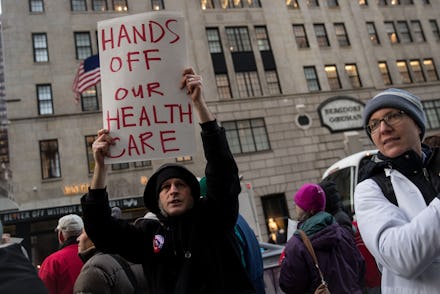Could "Trumpcare" be an existential threat to Medicare?

Whether you call it "Ryancare," "Trumpcare," "Obamacare Lite" or the American Health Care Act, the GOP’s new replacement for the Affordable Care Act is almost universally unpopular.
One of the biggest concerns critics have raised since the plan's release on Monday is the impact it would have on the future of Medicare.
The AARP opposes it
On Tuesday, the American Association of Retired Persons came out against the bill. The AARP's gripe is that the plan would destabilize Medicare, the federal program that provides health insurance for more than 55 million Americans, a majority of whom are 65 and older.
"AARP opposes this legislation, as introduced, that would weaken Medicare, leaving the door open to a voucher program that shifts costs and risks to seniors," Nancy LeaMond, AARP executive vice president, said in a statement Tuesday. "Before people even reach retirement age, big insurance companies could be allowed to charge them an age tax that adds up to thousands of dollars more per year. Older Americans need affordable health care services and prescriptions. This plan goes in the opposite direction, increasing insurance premiums for older Americans and not doing anything to lower drug costs."
If passed, the AHCA would reducing funding for Medicare. The bill repeals all the taxes imposed by the ACA, including those that pay for Medicare. On top of the Medicare payroll tax — 2.9%, half of which is paid by employees — the ACA requires individuals earning more than $200,000 per year and married couples earning more than $250,000 per year to pay an extra 0.9% tax, called the Additional Medicare Tax.
"We have serious concerns that the American Health Care Act repeals provisions in current law that have strengthened Medicare’s fiscal outlook, specifically, the repeal of the additional 0.9% payroll tax on higher-income workers," Joyce A. Rogers, AARP senior vice president of government affairs, wrote in a letter to Congress.
Seniors would pay more
Secondly, the proposed bill could see seniors paying much more for health care. Older people tend to have more health problems, which increases the cost of insuring them.
Under the ACA, insurers can charge older enrollees no more than three times as much as younger enrollees. But the AHCA would do away with that restriction, allowing insurance companies to charge older Americans "as much as they want," up to five times as much as the youngest Americans, Vox reported. And while the plan offers tax credits to help pay for health insurance, it's not enough to keep pace with what insurance companies can charge.
However, with opposition from conservatives, liberals and the AARP, the bill's chances of becoming law as-is look slim.
What does A Day Without a Woman look like? Show us! Mic wants to see what your office looks like when women go on strike. Send your stories, photos and videos to ADayWithoutAWoman@mic.com and we may feature them in an article or on our social media channels.